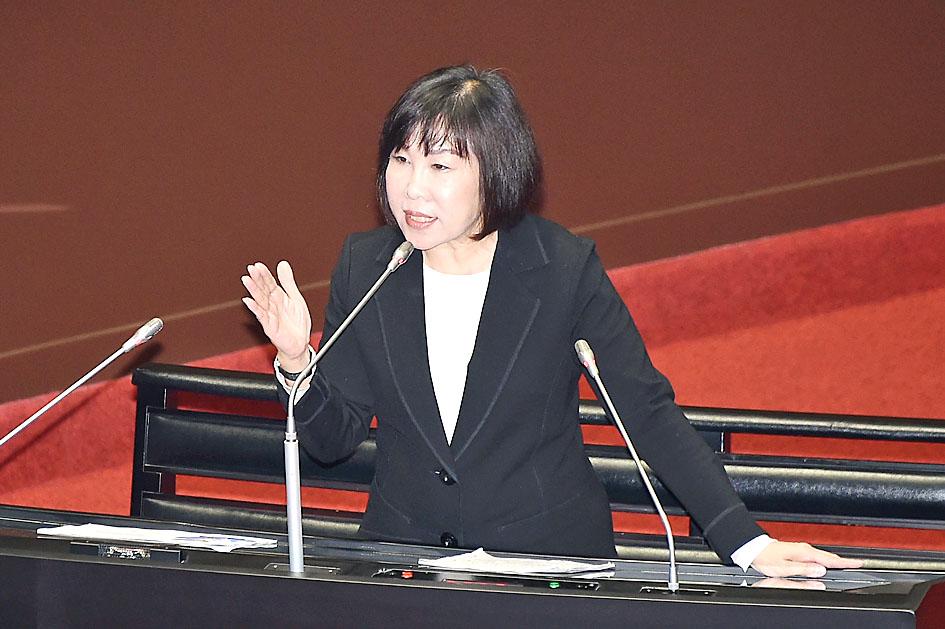The Legislative Yuan on Tuesday passed amendments to the Act for the Establishment of the National Chungshan Institute of Science and Technology (國家中山科學研究院設置條例) to impose travel restrictions on institute employees to protect technological secrets, among other changes.
The amendments are part of an effort to address regulatory issues arising from the institute’s decoupling from the Ministry of National Defense in 2014, which turned the nation’s defense research and development group into a governmental foundation.
If the amendments are promulgated, institute employees would have to obtain permission from authorities before traveling abroad.

Photo: Tu Chien-jung, Taipei Times
The amendments would also allow the institute to hire active-service military personnel, which eliminates bureaucratic rules that lawmakers across the political divide considered an impediment to the institute’s work.
The amendments authorize the institute to employ up to 858 active-service personnel with the appropriate technical expertise and exempt it from Paragraph 1, Article 20 of the Non-Departmental Public Bodies Act (行政法人法).
This means members of the armed forces can be employed at the institute while keeping their active-service status and benefits.
Democratic Progressive Party Legislator Wang Ting-yu (王定宇) and Chinese Nationalist Party (KMT) Legislator Lu Yu-ling (呂玉玲) were among the bipartisan group of lawmakers who proposed the changes to the hiring rules.
The amendments would facilitate the recruitment of military-trained engineers and experts, and give the institute the flexibility it needs to design the military’s weapons and equipment, the amendments’ statement of purpose said.
Performance evaluations at the institute must be stepped up, including following certain defense ministry protocols when conducting on-site re-evaluations, the amendments say, adding that re-evaluation reports must include a justification of their findings.
No gender should be represented by more than 75 percent of performance evaluation personnel, the amendments said.
Lawmakers said in an attached resolution that the defense ministry should within six months report to lawmakers on proposals to create a liaison system between the institute’s military officers and the armed forces.

An essay competition jointly organized by a local writing society and a publisher affiliated with the Chinese Communist Party (CCP) might have contravened the Act Governing Relations Between the People of the Taiwan Area and the Mainland Area (臺灣地區與大陸地區人民關係條例), the Mainland Affairs Council (MAC) said on Thursday. “In this case, the partner organization is clearly an agency under the CCP’s Fujian Provincial Committee,” MAC Deputy Minister and spokesperson Liang Wen-chieh (梁文傑) said at a news briefing in Taipei. “It also involves bringing Taiwanese students to China with all-expenses-paid arrangements to attend award ceremonies and camps,” Liang said. Those two “characteristics” are typically sufficient

A magnitude 5.9 earthquake that struck about 33km off the coast of Hualien City was the "main shock" in a series of quakes in the area, with aftershocks expected over the next three days, the Central Weather Administration (CWA) said yesterday. Prior to the magnitude 5.9 quake shaking most of Taiwan at 6:53pm yesterday, six other earthquakes stronger than a magnitude of 4, starting with a magnitude 5.5 quake at 6:09pm, occurred in the area. CWA Seismological Center Director Wu Chien-fu (吳健富) confirmed that the quakes were all part of the same series and that the magnitude 5.5 temblor was

The brilliant blue waters, thick foliage and bucolic atmosphere on this seemingly idyllic archipelago deep in the Pacific Ocean belie the key role it now plays in a titanic geopolitical struggle. Palau is again on the front line as China, and the US and its allies prepare their forces in an intensifying contest for control over the Asia-Pacific region. The democratic nation of just 17,000 people hosts US-controlled airstrips and soon-to-be-completed radar installations that the US military describes as “critical” to monitoring vast swathes of water and airspace. It is also a key piece of the second island chain, a string of

The Central Weather Administration has issued a heat alert for southeastern Taiwan, warning of temperatures as high as 36°C today, while alerting some coastal areas of strong winds later in the day. Kaohsiung’s Neimen District (內門) and Pingtung County’s Neipu Township (內埔) are under an orange heat alert, which warns of temperatures as high as 36°C for three consecutive days, the CWA said, citing southwest winds. The heat would also extend to Tainan’s Nansi (楠西) and Yujing (玉井) districts, as well as Pingtung’s Gaoshu (高樹), Yanpu (鹽埔) and Majia (瑪家) townships, it said, forecasting highs of up to 36°C in those areas